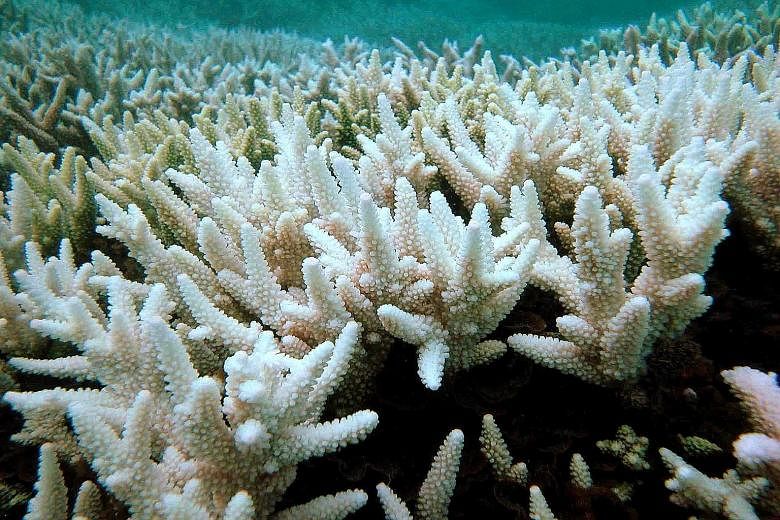SYDNEY • Scientists have warned that the world faces mass global coral bleaching next year driven by the warming effects of the El Nino weather phenomenon - and it could be the worst on record.
A study by the University of Queensland and the United States National Oceanic Atmospheric Administration said it would be only the third recorded global bleaching event in history, with areas such as Australia's Great Barrier Reef set to be hard hit.
"If conditions continue to worsen, the Great Barrier Reef is set to suffer from widespread coral bleaching and subsequent mortality, the most common effect of rising sea temperatures," said the university's Global Change Institute director Ove Hoegh-Guldberg.
"In the first major global event in 1998, more than half the Great Barrier Reef experienced bleaching with about 5 to 10 per cent of the corals dying. Thankfully the Great Barrier Reef was spared during the second global event (in 2010) due to storm activity which alleviated the heat stress. The reef may not be so lucky in 2016."
The reef - the world's biggest coral reef ecosystem - is already struggling from the threat of climate change, as well as farming run-off, development and the coral-eating crown-of-thorns starfish.
It narrowly avoided being put on the United Nations World Heritage in-danger list this year, with Canberra now working on a plan to improve the reef's health over successive decades.
Bleaching is a phenomenon that turns corals white or fades their colours, threatening a valuable source of biodiversity, tourism and fishing.
It occurs when reef symbiosis - the mutually beneficial relationship between two organisms that inhabit corals - is disrupted by a rise in ocean warming, although there can also be other causes.
One of the worst episodes on record, which hit reefs in 60 tropical countries, took place in 1998, when the El Nino weather pattern was exceptionally strong.
US government scientists in August said the El Nino currently under way - the first in five years - could be among the strongest in 65 years, while the authorities in Australia have predicted it would be "strong" and "substantial".
Corals depend on single-cell algae called dinoflagellates that live in vast colonies on their surface. When corals come under stress, such as from warmer seas, they expel the dinoflagellates. They then turn visibly pale, as the algae have the pigments which give the coral skeletons their distinctive colour. The reefs are not dead, but they become more susceptible to disease and will die if they fail to regain their plankton friends.
Mr Hoegh-Guldberg said research he conducted in 1999 predicted mass coral bleaching events would become successively worse over time if the world failed to deal with rising atmospheric gases.
"Unfortunately, 16 years later, these predictions are beginning to unfold," he said.
AGENCE FRANCE PRESSE

